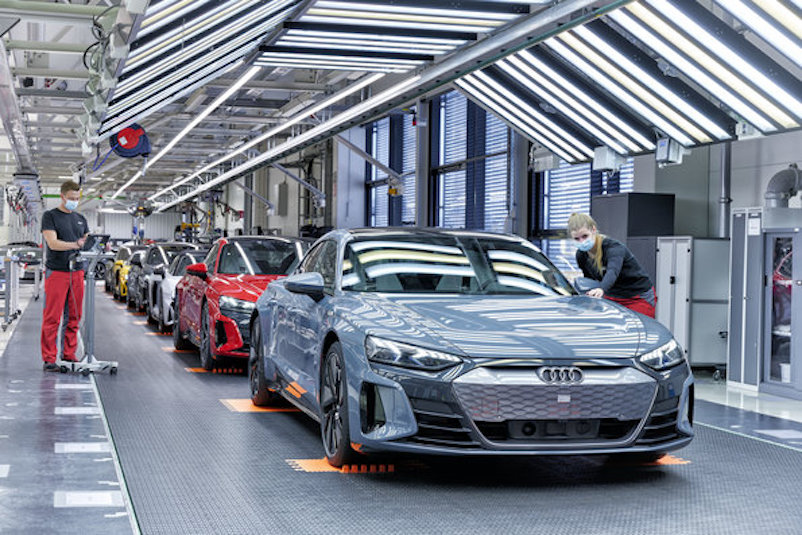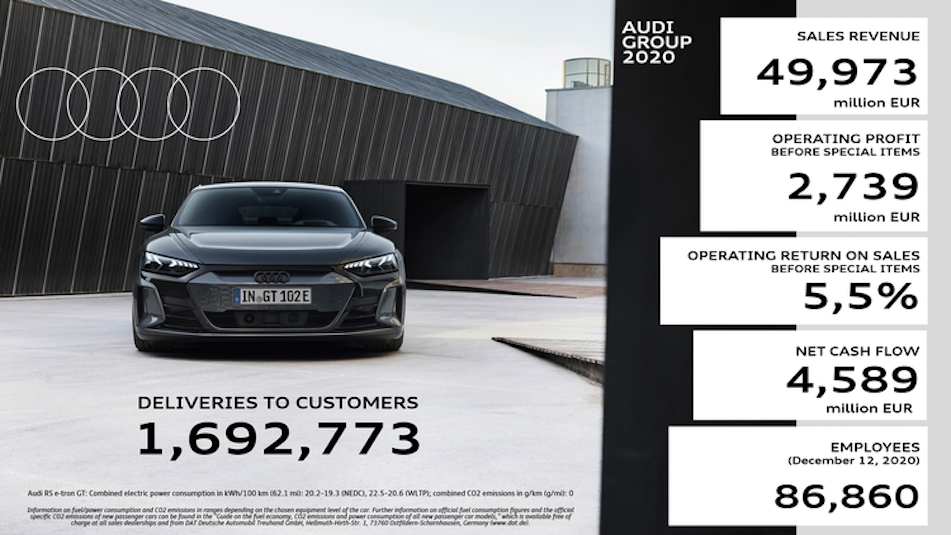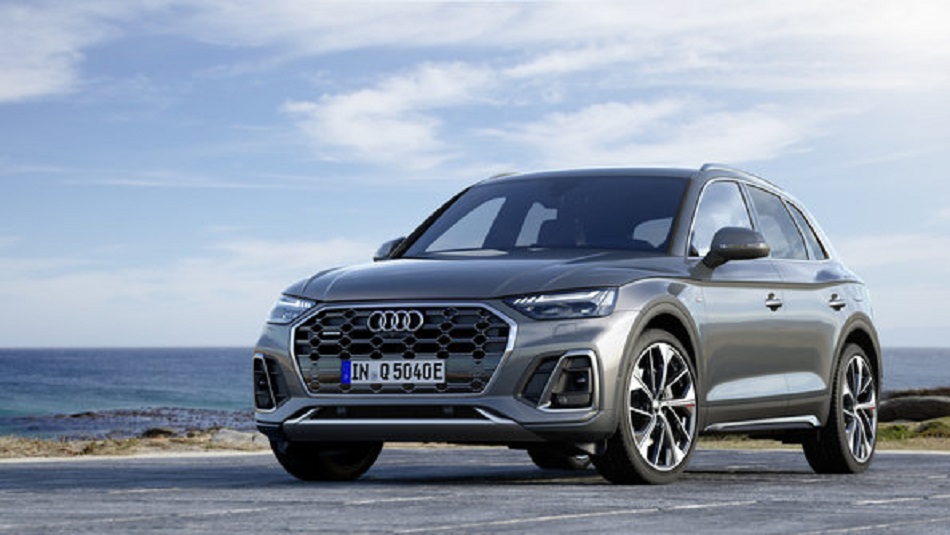
CEO Markus Duesmann: “A successful conclusion to the financial year 2020 thanks to a strong team performance”
In a challenging market environment: sales revenue approx. €50.0 billion
Operating profit before special items falls to €2.7 billion; operating return on sales before special items is 5.5 percent
Audi Transformation Plan (ATP) and Audi.Zukunft make important contributions
High level of net cash flow at €4.6 billion
Continuing clear focus on electromobility: in 2021, for the first time, more than half of the newly introduced models will be electrified
CFO Arno Antlitz: “Audi is strongly positioned and retains the scope for continued investment in future-related areas.”
|
Even in 2020, a challenging business year, Audi vigorously drove ahead its transformation into a provider of sustainable and networked premium mobility. As a result of the pandemic, deliveries and sales revenue fell significantly in the first half-year. Thanks to a strong second half, including an excellent fourth quarter, sales revenue reached a total of approximately €50.0 billion in the 2020 business year.
Operating profit before special items was €2.7 billion, and operating return on sales before special items was 5.5 percent. In addition to synergies in the Volkswagen Group, the Audi Transformation Plan (ATP) and Audi.Zukunft made important financial contributions. Net cash flow remains a strength of the company, with a figure of €4.6 billion.
The reasons for this are continuing cost and investment discipline and the divestment of shareholdings within the Volkswagen Group amounting to some €1.5 billion. The company moved purposefully ahead with its e-roadmap: in 2021 alone, Audi doubled the number of all-electric models in its range and is also reinforcing its PHEV offensive. Subject to developments in the corona pandemic and the supply of semiconductors, Audi views 2021 with cautious optimism.
“Audi has resolutely faced up to the challenges of the last year and done everything necessary to emerge stronger from the crisis,” says Markus Duesmann, CEO of AUDI AG.
“The global consequences of the corona pandemic had a decisive influence on our business year. Following a collapse in demand for cars in all regions of the world, stability returned to the markets later in the year – first in China, then in Europe and the USA too. In the fourth quarter, finally, we were able to conclude the year with a record number of deliveries – it was the most successful quarter in the company history. In total we earned an operating return on sales before special items of 5.5 percent in the 2020 business year. This achievement is also the result of responsible crisis management during the corona pandemic and above all a strong team performance. I am delighted at the willingness to change and the flexibility of Audi’s employees.”
The total number of deliveries of Audi-brand vehicles to customers in 2020 was 1,692,773 (2019: 1,845,573). Here the fall of approximately 8 percent resulting from the pandemic was significantly lower than the almost 15 percent fall in the total worldwide market.
Following a difficult start to the year, the markets recovered considerably: with 505,583 deliveries (4th quarter of 2019: 488,471), Audi was even able to conclude the financial year with the most successful quarter in company history. The reasons for this strong final surge in 2020 were active corona-crisis management by the company and a noticeable recovery in core markets. Through the expansion of digital sales and services, furthermore, Audi reacted flexibly to the challenges of the corona pandemic.
In 2020 the top-range and SUV models were especially successful. For example, deliveries of the Audi Q3 and Audi A6 rose by 18.1 and 11.8 percent respectively in comparison to the previous year. The all-electric Audi e-tron, together with the Audi e-tron Sportback, was the best-selling electric vehicle worldwide by a German premium manufacturer, with a growth in demand of almost 80 percent compared to the previous year. In this way the e-tron series is making a decisive contribution to fulfilment of the company’s targets on CO2 emissions. A new best result was also achieved in the business year 2020 by Audi Sport GmbH, with an increase of deliveries amounting to 16.1 percent above the previous year.
In terms of volume, the sales revenue of the Audi Group in 2020 amounted to €49,973 million (2019: 55,680 million) . The operating profit before special items was €2,739 million (2019: 4,509) million, equivalent to an operating return on sales before special items of 5.5 percent (2019: 8.1 percent).
The fourth quarter, above all, with an operating profit before special items of €2,456 million (2019: 1,271 million) and an operating return on sales of 14.7 percent (2019: 8.9 percent), helped the company to more than make up for the losses of the first half of the year.
This strong performance is attributable, on the one hand, to a significant rise in the numbers of vehicles delivered as the markets recovered. Moreover, Audi maintained strict discipline on costs and investment until the end of the year.
A positive contribution to the financial development was also provided by the successful implementation of the Audi Transformation Plan (ATP). Here, measures with a total value of €2.6 billion (2019: 2.5 billion) were put into effect. To a large extent these savings influenced the operating profits and will also have a sustained impact in the years to come. Since it began two years ago, this program to improve efficiency has released €7 billion.
The goal is to achieve a total of approximately €15 billion up to 2022 through measures on the cost and revenue sides. As a result of loss of volume due to the pandemic, there may be a slight delay in this, however.
The Audi.Zukunft (Audi.Future) agreement concluded in 2019 is also making a noticeable contribution to success through a reduction in employment costs. As before, the company stands by its employment guarantee until 2029 and is ensuring long-term competitiveness by using plant capacity on a platform basis.
“Even in the turbulent year of 2020, Audi demonstated its robust condition and healthy business situation,” says Arno Antlitz, CFO of AUDI AG.
“In the corona pandemic we have reinforced our discipline in investment and costs without compromising on the substance of the products or the Audi brand’s fitness for the future. Both the Audi Transformation Plan and the Audi.Zukunft basic agreement are well established. Both programs have made an important contribution to Audi Group results that are more than respectable, and have enabled us to continue investing in the electrification and digitalization of our products.”
 The financial results of the Audi Group increased in comparison to the previous year to €1,618 million (2019: 713 million). The principal reason for this was the good performance of the Audi brand in China, where recovery was already noticeable in March 2020 and the monthly delivery figures of the previous year were exceeded from April onwards. The financial results of the Audi Group increased in comparison to the previous year to €1,618 million (2019: 713 million). The principal reason for this was the good performance of the Audi brand in China, where recovery was already noticeable in March 2020 and the monthly delivery figures of the previous year were exceeded from April onwards. The cumulative figure for deliveries in China was 5.4 percent above the previous year – in spite of a decline in the market volume. In addition, the sale within the Volkswagen Group of Audi Electronics Venture GmbH had a favorable influence on the financial results amounting to €589 million. The final figure for pre-tax profits was €4,187 million (2019: 5,223 million).
The commitment of the Audi workforce in an extremely challenging year in 2020 was rewarded through participation in profits. For a skilled worker in the German plants, the Audi profit-sharing sum in 2020 is €1,080 (2019: 3,880). The basis for this is the calculation formula dependent on operating profits that is laid down in the wage agreement. In Audi subsidiaries, too, there are agreements on profit participation.
In addition Audi is paying a special bonus of €1,200 to employees of AUDI AG who are paid according to the collective wage agreement, to show appreciation of their flexibility and commitment during the corona pandemic.
The traditionally strong net cash flow of Audi rose in the challenging year of 2020 to a total of €4,589 million (2019: 3,160 million). This is mainly attributable to stricter control of investment and costs. Fixed investments, especially, were significantly reduced by Audi: the proportion amounts to 3.8 percent (2019: 4.9 percent).
Sale of shareholdings within the Volkswagen Group had a positive effect on net cash flow of €1.5 billion. Consequently net liquidity, at €22,377 million (2019: 21,754 million), remains stable at a high level.
In order to meet the challenges of transformation in the automotive industry, the Volkswagen Group is combining its resources. For this reason, at the annual general meeting in 2020 shareholders approved a squeeze-out in accordance with shareholding law. By this means, all shares held by minority shareholders of AUDI AG passed to Volkswagen AG.
This was an important step enabling Audi to maintain a strong and competitive position in the future. Synergies in the Volkswagen Group can now be exploited more efficiently. A key example of close cooperation in the Group is the Car.Software Organization, founded in mid-2020, in which the software knowhow of the Volkswagen Group brands is being united and expanded.
This new company of the Volkswagen Group, in which Audi CEO Markus Duesmann has taken the role of chairman of the supervisory board, is developing a unified electronics architecture and an operating system for all brands. At the end of 2024, this software platform will be premiered in the first Audi model based on the Artemis Project.
The operating system will be integrated step by step into all vehicles of the Volkswagen Group. Through the budgetary transfer of development costs to the Car.Software Organization and through efficiency gains in Technical Development, the share of research and development costs in the 2020 financial year fell to 7.3 percent (2019: 7.9 percent).
Investments in future models and technologies remain untouched at the Four Rings. In this way Audi is taking great strides forward in its electro-offensive during the pandemic. This business and strategic approach can be seen in the planned investments over the next five years.
Almost half of the total foreseen investments of €35 billion will flow into future technologies – about €15 billion of this for electromobility and hybridization alone.
In 2021 for the first time, more than half of the newly introduced models will be electrified. This began in February with the world premiere of the Audi e-tron GT1, the first all-electric Audi, made in Germany. By mid-year the Audi Q4 e-tron and Audi Q4 e-tron Sportback will already be on the starting line: these models enable the company’s customers to enter the electric world of Audi for the first time in the compact-car segment. Moreover, Audi is enhancing its range of PHEVs: in half of the internal-combustion series there will be a plug-in hybrid model in the current year.
Audi plans to offer more than 20 all-electric models by 2025 and aims to push ahead with a significant expansion of the PHEV portfolio. The company predicts that by this date about one third of global vehicle deliveries to customers will consist of all-electric and hybridized automobiles.
In implementing the e-roadmap, the Chinese market plays a decisive role. The company is further expanding its presence here and purposefully carrying out the reorientation of its business model. Audi established an important milestone by founding the Audi FAW New Energy Vehicle Company, a cooperative venture with FAW, a partner of many years.
On the basis of the Premium Platform Electric (PPE) jointly developed with Porsche, from 2024 onwards electric vehicles will be produced in Changchun (China) for the Chinese market. “China is a significant provider of technological impulses for us and a key pillar of Audi’s long-term success,” says Audi CEO Markus Duesmann.
“Especially in the premium segment, we see more enormous potential in China and will therefore strengthen our product portfolio further in our biggest market.” By the end of 2021 twelve Audi models will be produced in China at the long-established FAW-Volkswagen joint venture.
With a view to 2021 the Audi Group expects a recovery of the global economy, subject to further developments in connection with the corona pandemic. “We look forward to the year 2021 with cautious optimism,” says Arno Antlitz. “We want to carry over the strong momentum of the fourth quarter. Our ambitious goal is to grow significantly in comparison to the previous year.”
On the basis of its attractive product substance, the Audi Group expects a clear increase in deliveries and sales revenue in comparison to the previous year. For 2021 the company plans an operating return on sales of between 7 and 9 percent, and thus aims to approach its strategic zone of 9 to 11 percent.
In doing so Audi as a premium manufacturer is giving priority to product-related investments and reducing its strategic target zone for fixed investments by one percentage point to between 4 and 5 percent of sales revenue. In contrast Audi is intensifying investments in products and future technologies.
Instead of 5 to 6 percent,as hitherto, Audi plans to devote 6 to 7 percent of sales revenue to research and development – thus underlining its innovative strength and pushing forward its transformation into a provider of sustainable and networked premium mobility.
Summary of selected key figures of the Audi Group
|
|||||||||||||||||||||||||||||||||||||||




































